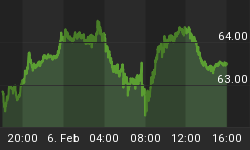US stock markets continue to rise as gold is breaking out and the Dollar is breaking down. Commentators are joining the bandwagon that believes equities are a way to increase one's wealth while the Dollar is falling. While stocks may ultimately rise due to a collapsing currency, that will only happen during hyperinflation. With a currency crisis on the horizon and the bond market priced for deflation, recommending stocks because the Dollar is falling sounds like the typical "this time will be different" talk that always accompanies bubbles. Instead, investors should be fleeing from US financial assets rather than accumulating them.
Below, we discuss some themes that are misunderstood.
The US Dollar Is A Bubble
The US Dollar is the real bubble. Although the bubbles in the 1990's and 2000's took the forms of stock market and housing bubbles, respectively, both bubbles were manifestations of the US Dollar bubble. Therefore, the Dollar is not weakening slowly from an overvalued level but instead is deflating. As with all bubbles, there is the potential for massive and rapid price declines. At some point, the Dollar will undergo a dramatic decline and investor complacency will turn to panic as the currency crisis gains momentum. Although people are buying US stocks because foreign earnings become more valuable when the Dollar weakens, or because they think stocks will retain their purchasing power better than cash, those same people would think it is illogical to buy stocks ahead of a currency crisis. Thus, it appears that investors still do not realize that the US Dollar is a bubble.
The US Treasury Market
With a near $2 trillion deficit this year, one might think that interest rates on US Treasuries would be significantly higher than today's rates. However, interest rates are low because the bond market appears convinced that there will be deflation because of high unemployment and low capacity utilization throughout the economy. This is in stark contrast to the equity market where, because of the weakening Dollar, participants have started to buy US stocks to access foreign earnings and to hedge against inflation. If the stock market is accurately predicting that the Federal Reserve will be successful in creating inflation, holders of government bonds will inevitably sell their Treasury holdings. As a result, rising long-term interest rates will undermine the Federal Reserve's efforts, harm the economic outlook, and lead to a decline in stock prices. On the other hand, perhaps the bond market is correct that deflation takes hold. If so, then the stocks that are rising as an inflation hedge are mispriced and likely to fall as deflation persists. Either way, divergences in inflationary and deflationary outlooks present a hurdle for the equity markets.
Two Likely Paths Of A Dollar Crisis
The key to understanding what causes the bond market to fall is figuring out what makes the Dollar's decline disorderly. There are two likely scenarios. The first is a continuation of current trends whereby the Dollar continues to fall and gold continues to rise, eventually ending with a loss of confidence in the US Dollar. In this scenario, investors who bought US Treasuries because of deflation will be forced to sell quickly. As this happens, long-term interest rates will rise and the cost and availability of credit in the US will become infinitely prohibitive, thereby leading to the collapse of all US assets.
A second possible path to the Dollar's demise involves a series of events. First, the bear market rally in stocks and credit will come to an end as the Federal Reserve slows its purchases of mortgage bonds. The market will realize that the US economy is not improving and panic will ensue. As this panic begins, the bonds held by investors, such as PIMCO, will initially rise in value as investors seek safety. As stocks fall, Wall Street will clamor for more intervention from the Federal Reserve and the Federal Reserve will undoubtedly come through with some new form of quantitative easing. Fears over the Dollar will reemerge as the Fed starts the printing press and the Dollar will irreversibly spiral downward.
Buy Stocks Because of Hyperinflation
Ultimately, the US will enter hyperinflation. It is important to remember that hyperinflation will be as bad, if not worse, than a depression - savings will be worthless, unemployment will soar, and there will be significant corporate bankruptcies. Before hyperinflation begins, the bond market must first collapse for the reasons stated above. Buying stocks ahead of that event is fraught with risk. Yet after the bond market's collapse forces the Fed to crank up the printing press in order to prop up the bond market, people can turn to stocks to preserve, and even grow, one's purchasing power. For example, Zimbabwe's stock market has soared because of hyperinflation despite terrible economic woes.
Additional Comments on Stocks
According to industry reports, mutual fund cash is at a mere 4% of holdings, which is near the October 2007 level when the stock market topped. Furthermore, bullish/bearish indicator levels are similar to levels at market tops. We think that these statistics show how strongly people believe a weakening Dollar supports the purchasing of stocks. Investors might want to be careful what they wish for.
Conclusion
The stock and bond markets are currently priced for contrasting outcomes. Some investors are buying stocks as an inflation hedge because of the weakening Dollar, whereas other investors are so confident in deflation that they are continuing to buy long-term Treasuries despite the weakening Dollar. Determining which market is right will be dictated by how far and how fast the Dollar falls and by the amount of additional Federal Reserve intervention. Regardless, the Dollar is a bubble and thus it will eventually pop. Instead of taking risk in US financial assets, investors should look to gold and silver as a medium to preserve their purchasing power ahead of the inevitable currency crisis.















